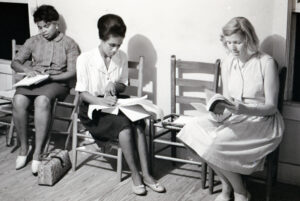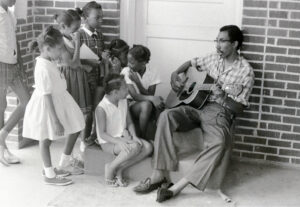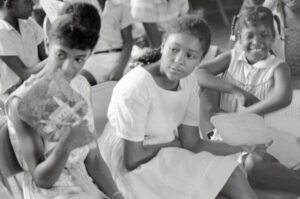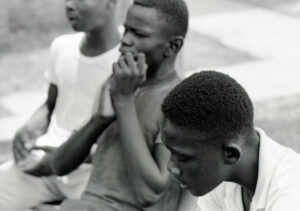To Build the Life She Wanted for Her Son, She Left Behind an Addiction
For Irene Montoya, becoming a mother in 2009 was a long held dream come true. At the time, she was years into a methamphetamine addiction and had never held a job for very long. She knew she’d have to make some big changes to her life.
 Irene Montoya and Gianni Booth in her truck in Cheyenne, WY in 2021. Courtesy of Irene Montoya.
Irene Montoya and Gianni Booth in her truck in Cheyenne, WY in 2021. Courtesy of Irene Montoya.
After getting clean during her pregnancy, Irene relapsed while Gianni was still a toddler. As a single parent, she struggled to make enough money for a decent place to live. At one point, Irene and Gianni found themselves sleeping in their car.
After a decade clean and sober, their lives look very different. Irene started her own company, Sunflower Trucking, and Gianni is attending a private high school. They came to StoryCorps in Cheyenne, Wyoming to talk about their family’s hard times and the turning point in their lives.
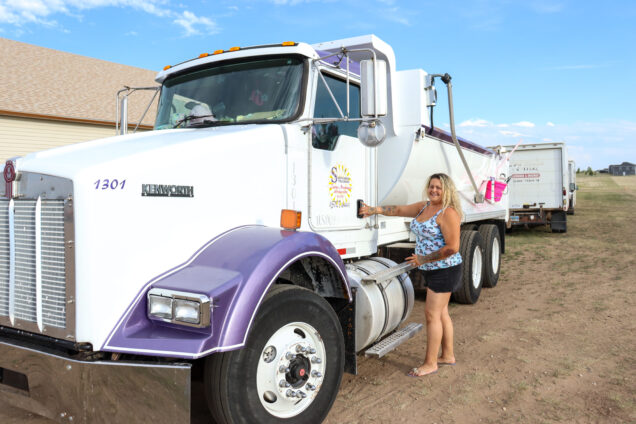 Irene Montoya with her custom-built dump truck in Cheyenne, WY on June 16, 2024. By Zanna McKay for StoryCorps.
Irene Montoya with her custom-built dump truck in Cheyenne, WY on June 16, 2024. By Zanna McKay for StoryCorps.
Top Photo: Gianni Booth and Irene Montoya at their StoryCorps interview in Cheyenne, WY on June 16, 2024. By Zanna McKay for StoryCorps.
This broadcast is supported in part by the Corporation for Public Broadcasting, a private corporation funded by the American people, and the National Endowment for the Arts.
Originally aired August 2, 2024 on NPR’s Morning Edition.
Game Changers
On the first episode of a new sports-themed season of the StoryCorps Podcast, we’re talking about the game changers: People who altered how their sport was played. Some of these changes were tiny ones we now take for granted. Others changed how the sport looked. But after they made their mark, nothing was the same.
If you want to leave the StoryCorps Podcast a voicemail, call us at 702-706-TALK. Or email us at [email protected].
Released July 30, 2024.
Sixty Years Later: The Children Of Freedom Summer Look Back
In 1964, civil rights groups organized Freedom Schools: summer programs for kids across the state of Mississippi.
Freedom School class at Mt. Zion Baptist Church in Hattiesburg, Mississippi, students on the church steps with their teacher.
More than 2,500 children attended 41 schools. Classes ranged from literature and math to theater and crafts. But the central focus was government and civic engagement.
Ethel Murrell (L) Stokes and Theresia Clark (C) at Priest Creek Missionary Baptist Church Freedom School in Palmers Crossing with their teacher volunteer Sandra Adickes (R).
Many of the teachers were white college students who had traveled from across the country to participate.
Folksinger Julius Lester singing for Freedom School students on the steps of Mt. Zion Baptist Church in Hattiesburg. Glenda Funchess standing (second from left).
Hattiesburg, Mississippi had six schools – more than any other town.
The Clark sisters at a church during Freedom Summer in Hattiesburg, Mississippi, 1964.
This was one piece of a larger program called “Freedom Summer.” More than 700 volunteers, from across the country came to Mississippi to register Black voters en masse and fight discrimination at the polls.
Donald Denard (Center) with two other students outside Morning Star Baptist Church.
Sixty years later, Freedom School students Deborah Carr, Stephanie Hoze, Theresia Clark-Banks, Julia Clark-Ward, Glenda Funchess, and Donald Denard came to StoryCorps to reflect on their memories of that summer.
Top Photo: Clockwise Left to right: Stephanie Hoze, Donald Denard, Glenda Funchess, Julia Clark-Ward, Theresia Clark-Banks, and Deborah Carr at their StoryCorps interview in Hattiesburg, MS on March 10th and 11th, 2024. By Tamekia Jackson for StoryCorps.
Archival photos courtesy of Herbert Randall Freedom Summer Photographs, Special Collections in McCain Library and Archives, The University Southern Mississippi. Copyright Herbert Randall.
This broadcast is supported in part by the Corporation for Public Broadcasting, a private corporation funded by the American people, and the National Endowment for the Arts.
Originally aired July, 26, 2024, on NPR’s Morning Edition.
“She’s probably the strongest woman you’ll ever meet.” Remembering the Mother of Women’s Judo
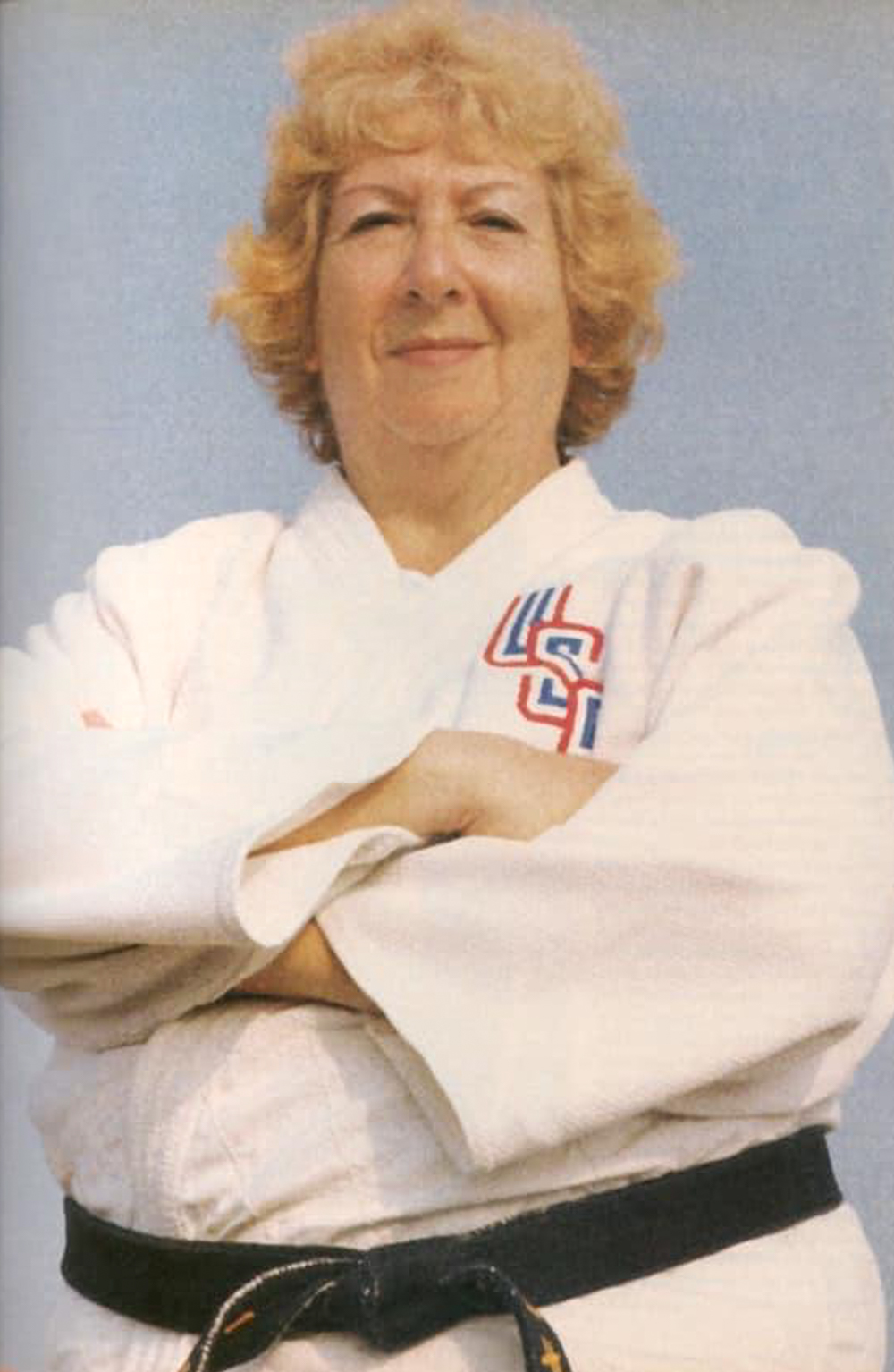
Women’s judo wasn’t allowed into the Olympics until 1988, after martial arts champion Rusty Kanokogi threatened to sue the International Olympic Committee for discrimination. This helped earn her the nickname, “the mother of women’s judo.”
Her daughter, Jean Kanokogi, remembers a physically powerful figure with a presence so imposing “You didn’t even have to turn around, because you felt that she was in that room.”
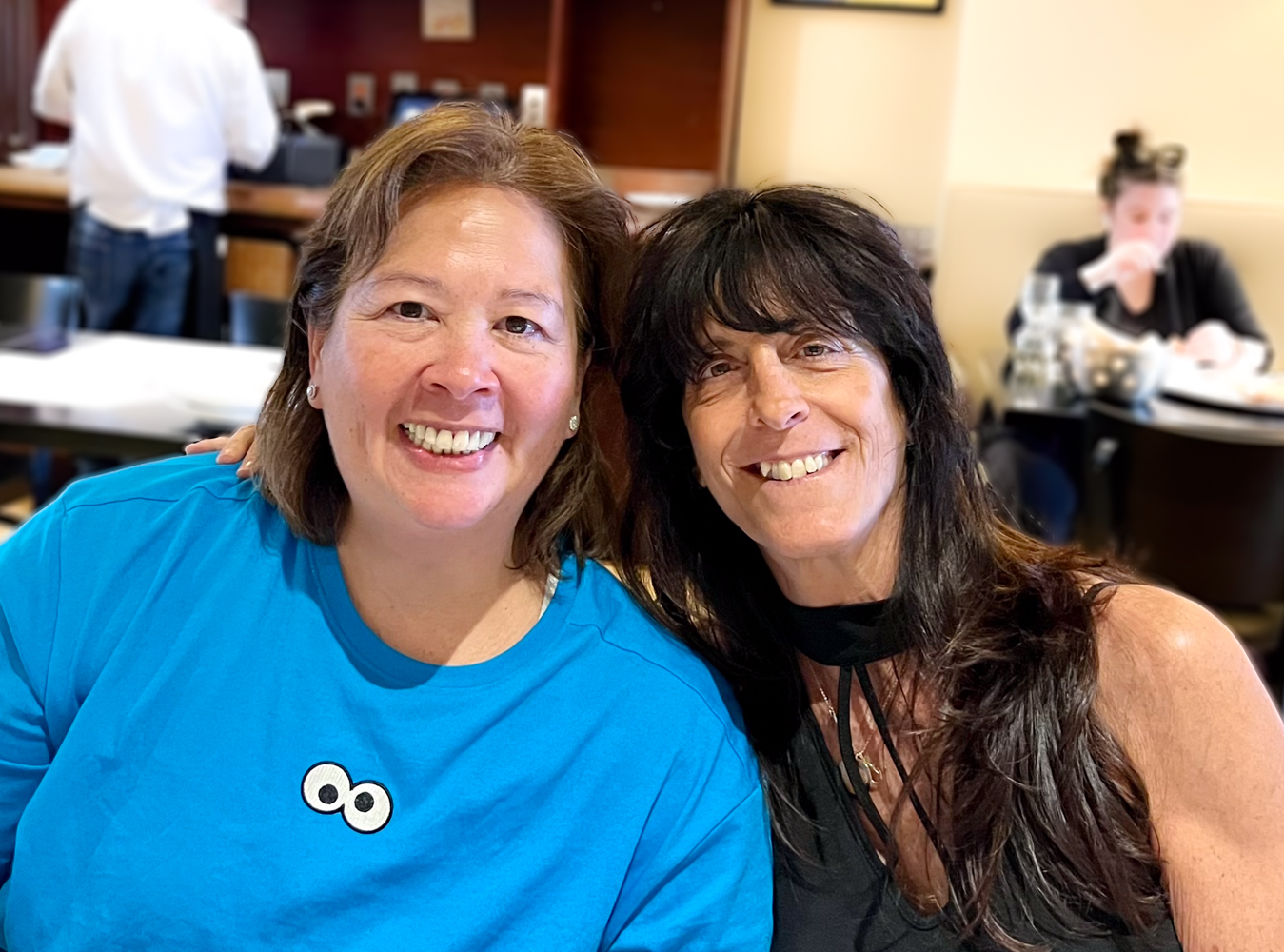
Eve Aronoff Trivella was coached by Rusty on the first U.S. women’s judo team at the 1988 games. At StoryCorps, she and Jean remembered what that competition meant to Rusty… and a pivotal moment from her early life that brought her there.

This broadcast is supported in part by the Corporation for Public Broadcasting, a private corporation funded by the American people, and the National Endowment for the Arts.
Originally aired July 19, 2024, on NPR’s Morning Edition.
How One Man Found Purpose in Being a Death Doula
Michael Rogers has found great pride in his work as a death doula, providing spiritual and emotional support to those transitioning to the end of their lives.
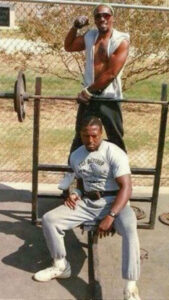 Michael Rogers and a friend at the Bastrop Federal Penitentiary in Bastrop, Texas in the late 80s. Courtesy of Michael Rogers.
Michael Rogers and a friend at the Bastrop Federal Penitentiary in Bastrop, Texas in the late 80s. Courtesy of Michael Rogers.
This work also made Michael reflect on his own life and choices. As Michael told his stepson at StoryCorps, some of those choices landed him in prison where he realized he wanted to live a meaningful life.
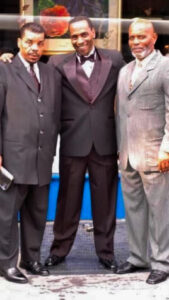 Michael Rogers and his brother’s at Michael’s wedding in the Lower East Side, New York, in 2004. Courtesy of Michael Rogers.
Michael Rogers and his brother’s at Michael’s wedding in the Lower East Side, New York, in 2004. Courtesy of Michael Rogers.
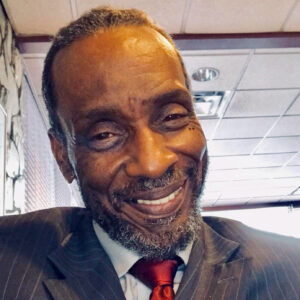 Michael Rogers at the House of Refuge Church of God and Christ in Los Angeles, California. Courtesy of Michael Rogers.
Michael Rogers at the House of Refuge Church of God and Christ in Los Angeles, California. Courtesy of Michael Rogers.
Top Photo: Michael Rogers at his StoryCorps interview in Manhattan, New York on March 19, 2006. By Laura Spero for StoryCorps.
This broadcast is supported in part by the Corporation for Public Broadcasting, a private corporation funded by the American people, and the National Endowment for the Arts.
Originally aired July 12th, 2024, on NPR’s Morning Edition.
From War Zones To Flood Zones: Two Veterans Find A New Calling
Lt. Commander Michael Davidson grew up listening to his grandfather, who he called “Pipa,” tell stories from his time in the Navy. He was determined to follow in Peepaw’s footsteps, and spent 23 years on ships and submarines.
Windy Barton also followed her grandfather’s path into the Navy, and spent 4 years on ships—fighting engine fires and making major repairs while out to sea.
Both Windy and Michael struggled to feel fulfilled after leaving the military, until they discovered Team Rubicon: a special team of veterans who go into the fray when natural disasters strike.
They came to StoryCorps to reflect on what inspired their sense of duty, and the new calling they’ve found in helping others when they are most in need.
Top Photo: Windy Barton and Michael Davidson at their StoryCorps interview in Arlington, Texas on November 14, 2023.
This interview was recorded in collaboration with Team Rubicon.
This broadcast is supported in part by the Corporation for Public Broadcasting, a private corporation funded by the American people, and the National Endowment for the Arts.
Originally aired July 6, 2024, on NPR’s Weekend Edition Saturday.
StoryCorps Launches One Small Step America with National PSA Campaign
StoryCorps has launched One Small Step America, an effort to nationally scale the organization’s One Small Step (OSS) initiative. The kick-off will include a national PSA campaign with digital, print, broadcast, and outdoor advertising in markets across the country. Having focused One Small Step in three local Model Communities since 2021, StoryCorps today makes it possible for anyone, anywhere in the country, to quickly and easily participate in a One Small Step conversation.
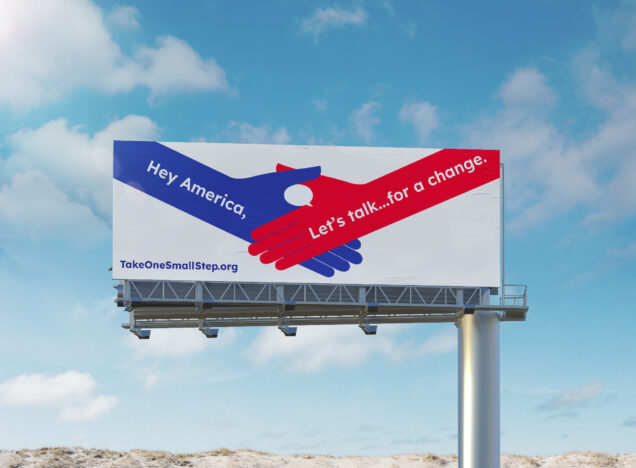
In development since 2017, OSS pairs strangers with opposing political beliefs for conversations, not to debate politics, but to get to know each other as fellow Americans. The initiative is based on social psychology’s contact theory and to date, more than 5,400 people in over 40 states have participated in OSS.
Dave Isay, Founder and President of StoryCorps, said, “We are not as divided or as different as we think. In fact, 9 out 10 Americans are tired of division, scared of where it’s leading the country, and looking for a way out. As we scale One Small Step nationally, we want people to know that they are part of the ‘exhausted majority.’ One Small Step offers hope, sanity, and a simple step for Americans to take to help close the divides tearing at the very fabric of our nation. We believe we are uniquely positioned to make an impact, and will fight with everything we’ve got—because if the culture of contempt wins, we all lose.”
Research by accomplished scientists and pollsters shows that One Small Step is singularly effective in helping people with opposing political views see the humanity in their fellow Americans, and in seeding hope for meaningful communication once again.
The PSA campaign, designed by creative agency I.D/W and featuring the designs of famed illustrator Noma Bar, will lead with the message “Let’s Talk…for a Change.” It will direct people to TakeOneSmallStep.org, where they can see conversations across the political divide modeled by OSS participants, sign up to record their own One Small Step conversation, or simply find more information about the initiative. Click here to learn more.
How A Woman Found Herself – and Love – on the Dance Floor.
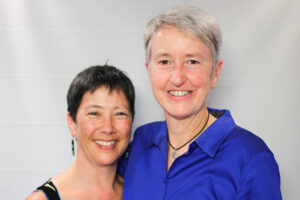 Ann Taylor and Sonja Furiya at their StoryCorps interview in St. Louis on September 24, 2014. By Emily Janssen for StoryCorps.
Ann Taylor and Sonja Furiya at their StoryCorps interview in St. Louis on September 24, 2014. By Emily Janssen for StoryCorps.
Having lived in St.Louis for 15 years, Ann Taylor was looking to meet new people. She received an email about a queer ballroom dancing class and decided to go.
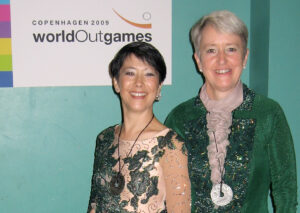 Ann Taylor and Sonja Furiya at the World Out Games in Copenhagen in 2009. Courtesy of Sonja Furiya.
Ann Taylor and Sonja Furiya at the World Out Games in Copenhagen in 2009. Courtesy of Sonja Furiya.
This led Ann to become something she never imagined, a dancer.
Ann came to StoryCorps with her wife Sonja Furiya to reflect on the day they met in that dance class in 2005.
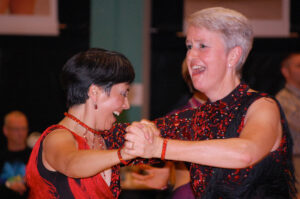 Ann Taylor and Sonja Furiya at the World Out Games in Copenhagen in 2009. By Eve Gilstrap.
Ann Taylor and Sonja Furiya at the World Out Games in Copenhagen in 2009. By Eve Gilstrap.
This broadcast is supported in part by the Corporation for Public Broadcasting, a private corporation funded by the American people, and the National Endowment for the Arts.
Originally aired June 28, 2023, on NPR’s Morning Edition.
“I Was Born In A Refugee Camp.” Two Sisters Reflect On Struggle And Survival
Sisters Mai Lo Lee and Beth Lo grew up in a large Hmong family on a ginseng farm in Wisconsin. But their story dates back to the American War in Vietnam.
Originally from Laos, the Lo family fled persecution after the country fell to communist forces in the mid 1970s. The new regime declared the Hmong people enemies of the state, as they’d fought alongside the U.S. against the communist government.
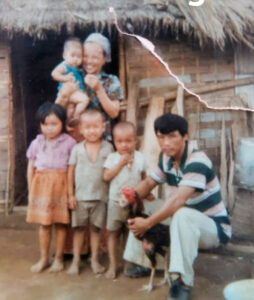 The Lo family in the Ban Vinai Holding Center, Thailand, in 1980. Photo courtesy of Mai Lo Lee.
The Lo family in the Ban Vinai Holding Center, Thailand, in 1980. Photo courtesy of Mai Lo Lee.
The Lo family crossed the Mekong River, which borders Laos and Thailand, and spent years in the Ban Vinai Holding Center—a refugee camp in Thailand. In 1980, six months after Mai was born, they immigrated to the U.S. and resettled in Wisconsin, where the parents found work as ginseng farmers.
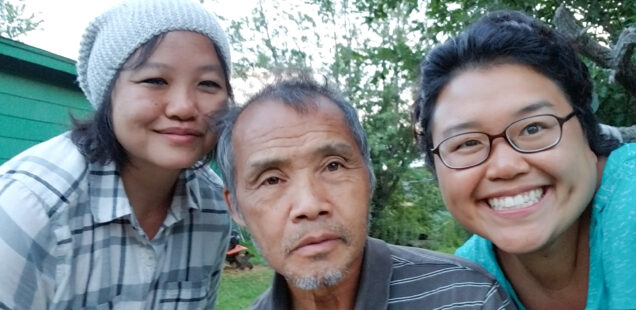
Beth and Mai Lo with their father, Sai Vue Lo, in Wausau, WI, circa 2018. Photo courtesy of Mai Lo Lee.
At StoryCorps, the sisters reflected on their family’s struggles and survival, their Hmong heritage, and how a rice steamer became a family legend.
Top Photo: Beth Lo and Mai Lo Lee at their StoryCorps interview in Appleton, WI on August 20, 2023. By Delilah Righter for StoryCorps.
This broadcast is supported in part by the Corporation for Public Broadcasting, a private corporation funded by the American people, and the National Endowment for the Arts.
Originally aired June 21, 2024, on NPR’s Morning Edition.
Beat by Beat
Born to beatbox.
Edward Cage & Nicole Paris
In the 1980s, Ed Cage fell in love with beatboxing through the St. Louis hip hop scene. When he became a dad, his talent became a way to connect with his daughter, Nicole Paris. At StoryCorps, Ed and Nicole talk about how he passed the beat on to the next generation.
Listen to Ed and Nicole’s original StoryCorps interview.
Para subtítulos en español, haga click en el ícono de YouTube en la esquina derecha, y escoja “Spanish” bajo la opción de “settings” y “subtitles/CC.

